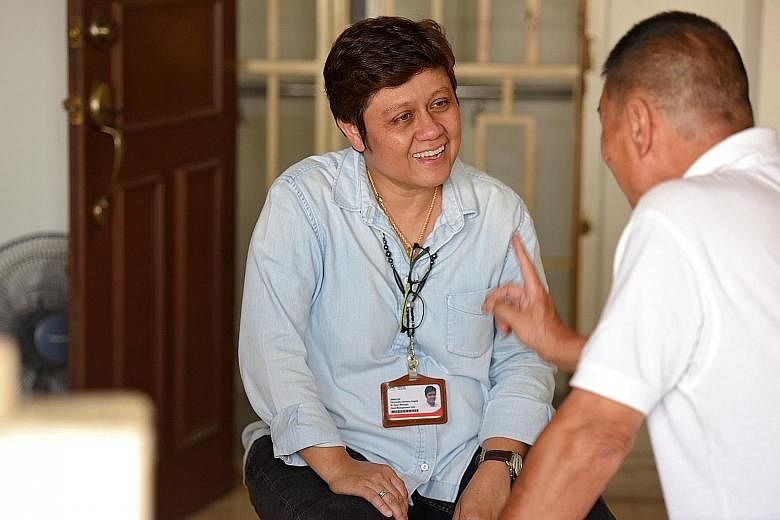When Ms Gemma Angela Fernandez first met the 60-year-old mental health patient more than a year ago, he was not in a good way.
Mr Lim (not his real name) was often found in the void deck of his block, shouting at the top of his voice and scaring people in the neighbourhood. Staff at the senior activity centre in his block asked Ms Fernandez to help.
The senior case manager from the Institute of Mental Health (IMH) deals with people like Mr Lim, who has schizophrenia, a major psychotic illness that affects how one thinks, feels and behaves.
Ms Fernandez managed to get him admitted into IMH for treatment, but she had to convince his adult children of the need to do so.
She said: "The biggest fear his daughter had was, 'What if dad doesn't get better and blames me for sending him to IMH?' I told her that I would show her results."
Ms Fernandez helped Mr Lim settle back into the community after his discharge. He managed to find work as a cleaner late last year.
Ms Fernandez, 51, is one of 53 IMH case managers who help about 4,000 patients find their feet on discharge, in a bid to prevent relapses.
The Government announced this year that more patients can expect such help. According to a joint response from the Ministry of Health and the Agency for Integrated Care, IMH will support an additional 3,000 patients in the next five years. IMH's case management unit head Margaret Hendriks said it plans to add 12 more case managers in 2018.
Case managers get in touch with patients within 48 hours of their discharge and work closely with community agencies. Ms Fernandez said: "We will get patients connected with family service centres. We co-manage the patients."
They do home visits together to assess the patient and his environ- ment. She said: "I'll check on his medication and see if he needs help. A lot of my patients live in rental units. We tell them to go downstairs to be with others in the community."
She liaises with agencies such as the Housing Board, police and community centres. "I help patients find work and get financial help or refer them to get government support," she said.
Every case is reviewed six months later. If the patient is stable, the community partner will take over his care. But the case manager will be asked to help if there is a need.
Patients under Ms Fernandez's care are in their 40s to 60s. Close to 80 per cent of them have psychosis, mostly as a result of schizoprenia and delusional disorders, which can be managed with medication.
Her success with Mr Lim did not come about without effort.
About 11/2 weeks before he was due to be discharged, she asked a community psychiatric nurse from IMH - whose job is to support patients with psycho-social rehabilitation at home - to visit Mr Lim.
Ms Fernandez said: "This was to help him feel more comfortable with the nurse before his discharge. The paranoia associated with schizophrenia may cause a person to be guarded."
Upon his discharge, Ms Fernandez linked him up with a case worker from the family service centre. She also found him support from the Government's social service office, so that he would get a monthly allowance of $350.
Ms Fernandez, who is single, finds joy and satisfaction in helping patients regain a normal life, such as to be stable enough to get married or to be a parent. "The biggest problem is getting them to acknowledge they have a mental illness," she said.
The greatest satisfaction she had with Mr Lim was to help him feel like a father again. The divorcee took her advice to invite his children over for a Chinese New Year meal. She said: "They came to his place for dinner and he gave them hongbao. It was great."
Mr Lim did not wish to be interviewed but agreed to say a few words through her: "Now I am happy because my children are happy."


